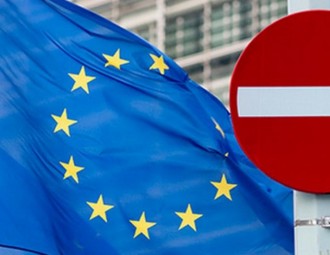Andrei Yahorau: There is no such thing as stance of the Belarusan authorities on Crimea or Donbas

The head of the Center for European Transformation contradicts UN Special Rapporteur on Belarus, who believes that Minsk’s position in Russia-Ukraine conflict is the main reason for lifting sanctions.
On October 29 the EU suspended sanctions re the official Minsk until February 29.
The UN special Rapporteur on the situation of human rights in Belarus Miklos Haraszti links this situation with the position that the Belarusan authorities have regarding Crimea and Donbas.
““Even if the formal occasion for the suspension was the release of the prisoners, I find it important to distinguish between geopolitics and human rights. I see the suspension of the sanctions as a geopolitical move, honoring President Lukashenka’s relatively independent line vis-à-vis Russia’s annexation of Crimea and similar developments in East Ukraine,” Haraszti emphasized in the interview with Belsat.
Andrei Yahorau, political scientist, the Director of the Center for European Transformation in the interview with the “EuroBelarus” Information Service expressed strong disagreement with such viewpoint.
- Why did the EU suspended sanctions against the official Minsk?
- Suspension of sanctions is related to the release of political prisoners and comparably calm course of the election process. These two reasons explain the suspension of sanctions against the Belarusan authorities.
- The UN special Rapporteur on the situation of human rights in Belarus Miklos Haraszti disagrees with you. In the interview to Belsat he stated that the possible reason for suspending sanctions is official Minsk’s position on Russia-Ukraine conflict, on Crimea or Donbas.
- It’s a pity that in this case Haraszti thinks so: there is no such thing as stance of the Belarusan authorities on Crimea or Donbas. De facto Belarus recognizes Crimea’s annexation by recognizing the passports. The official Minsk also has no stance on Donbas, despite the area for negotiations that Belarus provides. There are no international and legal grounds so that to take into account this stance in decision on sanctions.
It is weird to hear such statements from Miklos Haraszti, who is a Special Rapporteur on human rights. What does Crimea and Donbas have to do in his evaluations? In my opinion, it would be important for him to emphasize that the situation with human rights in Belarus didn’t change.
Miklos Haraszti doesn’t at all understand the real core of the happening processes. Substitution of concepts is happening: lobbying of Minsk made it possible to make a fool of the international structures.
- At the same time, the US also mitigated sanctions in hope for further democratization of Belarus. Are these hopes justified?
- It is the presence of the political prisoners that conditioned the introduction of sanctions re the official Minsk; and since Minsk lifted these grounds a need to provide it with an opportunity to make further steps for improving inner political situation emerged. Such opportunity is given – it’s Minsk’s turn to make a step.
- Both the EU and the US give the official Minsk a chance for normalization of relations with the West. Will Belarusan authorities use this chance?
- If absolute antagonism is reigning in the relations of the official Minsk with Europe and the US, if the West is perceived as an enemy no improvement will come in future. However, western direction of cooperation can bring Belarus much profit.
Movement towards the West is an unavoidable prospect, a long-term trend that Belarus will be drawn into despite its will and resistance. However, it is hard to forecast concrete steps of the Belarusan authorities, since they do not comply with the rationality.
- Lukashenka himself disrupted the hopes of the Western politicians for introducing economic reforms and Belarus’ democratization. Six months will pass, and EU’s suspension of sanctions will be over. US easing the sanctions will end even earlier. What’s next? Will sanctions return?
- If the situation in Belarus preserves status quo (i.e. neither bad nor good developments happen), the suspension of sanctions will continue, but sanctions themselves won’t be abolished. However, extraordinary excesses, caused by mass violation of human rights or other violations will lead to the restoration of sanctions. But in this case the actions of the authorities have to be tough, and violations of human rights should be outrageous. If the situation develops neither good nor bad, just as it is now, suspension of sanctions will be prolonged.
How long will it continue? I think that up to the next parliamentary elections.
-
03.01
-
07.10
-
22.09
-
17.08
-
12.08
-
30.09








































